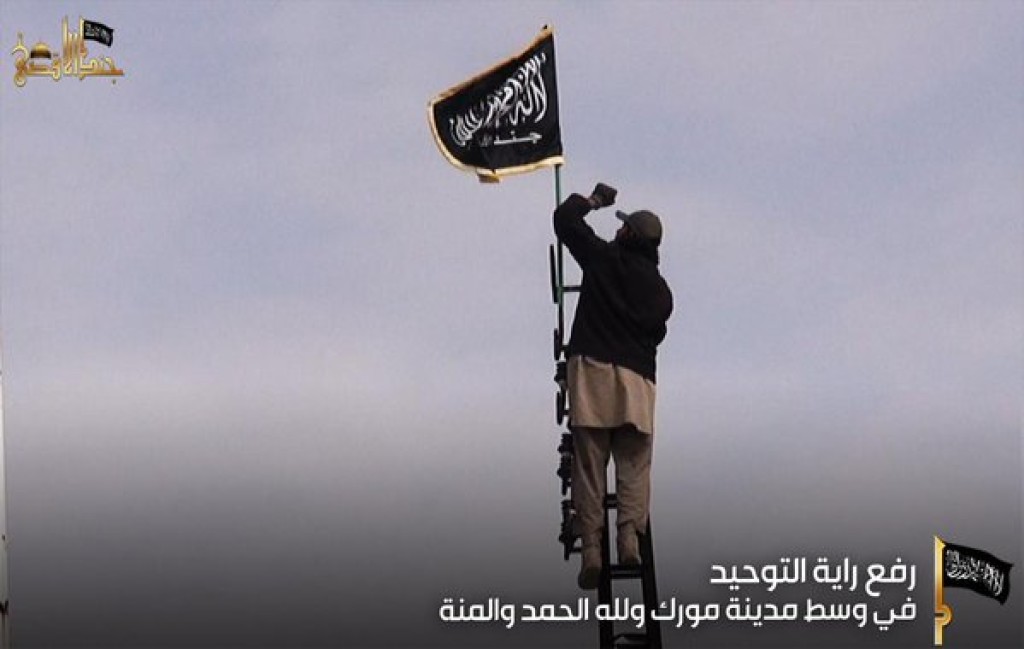Twelve jihadists who are purportedly senior figures in Jund al Aqsa, an al Qaeda-linked group, have joined Al Nusrah Front. The dozen jihadists explained their decision to join al Qaeda’s official branch in Syria in a statement that was released on social media earlier today. Their declaration has been translated by the SITE Intelligence Group.
“Our leave from the Jund Al Aqsa group and joining [Al Nusrah] is a response to the Command of Allah the Almighty to be firm and unite the ranks, and in obedience to the scholars of the Ummah and the scholars of jihad, and to strengthen the ranks of the mujahideen,” the signatories explained.
Like many other jihadist organizations, Jund al Aqsa offers little transparency with respect to its leadership hierarchy. Judging by the reaction from jihadists on social media, it appears that the twelve men are senior figures in the group. But it is noteworthy that none of them are described as being Jund al Aqsa’s overall emir, or leader. The short descriptions contained after the signatories’ names indicate that they are a mix of sharia (or religious) and military officials.
The authors urge “the mujahideen of all factions and names to seek” unity because their real enemies are the Shiites and the “atheists.”
As The Long War Journal first reported, Jund al Aqsa has been a front for al Qaeda, as senior operatives loyal to Ayman al Zawahiri have served in its ranks.
One of them was Adel Radi Saker al Wahabi al Harbi, a Saudi who was likely a member of al Qaeda’s elite Khorasan Group. Before relocating from Iran to Syria, Harbi served as the deputy to Muhsin al Fadhli, who planned “external operations” (attacks against the West) on behalf of the Khorasan Group. As Fadhli’s deputy, Harbi helped manage al Qaeda’s network inside Iran. After he was killed in April 2015, Harbi was publicly identified as Jund al Aqsa’s military commander in Syria. [See LWJ report, An al Qaeda front group in Syria.]
In May, another seasoned al Qaeda member, Said Arif, was killed while leading Jund al Aqsa’s forces. Arif’s death was reported by multiple jihadists on social media. He was allegedly killed in an airstrike conducted by the US-led coalition. [See LWJ report, Another al Qaeda veteran reportedly killed while leading Jund al Aqsa in Syria.]
Jund al Aqsa was founded by Sheikh Abdul Aziz al Qatari, who reportedly fought for al Qaeda in Afghanistan and is believed to have been close to Osama bin Laden and Ayman al Zawahiri. Qatari’s corpse was found in Syria in late 2014, months after he disappeared under mysterious circumstances.
Disagreements within Jund al Aqsa
On Oct. 23, 2015, Jund al Aqsa announced its split from the Jaysh al Fateh coalition in Syria. The move raised eyebrows in the jihadist community as Jaysh al Fateh was co-founded by Al Nusrah Front, al Qaeda’s main arm in Syria, and Jund al Aqsa’s own ties to al Qaeda are easy to see.
Jund al Aqsa played an important role in some of Jaysh al Fateh’s key battles in northwest Syria in 2015. During the battle for the city of Idlib, for example, its suicide bombers struck checkpoints manned by the Assad regime early on, thereby paving the way for other fighters to stream in. Idlib fell to Jaysh al Fateh in just several days.
Jund al Aqsa’s break from Jaysh al Fateh threatened to weaken the jihadists’ unity. However, it did not mean that the entire organization had left al Qaeda’s ranks.
There have been significant disagreements within the group. Jund al Aqsa has butted heads with other jihadists fighting in Syria as well. It is widely suspected that some members are sympathetic to the Islamic State, Al Nusrah’s chief jihadist rival. There have been multiple reports over the past several months that the Islamic State has used cells embedded within Jund al Aqsa to attack Al Nusrah officials and their allies in Idlib and elsewhere.
When it announced its departure from Jaysh al Fateh last year, Jund al Aqsa’s leadership said it objected to some of the tactics adopted by Ahrar al Sham, which is closely allied with Al Nusrah and has also had senior al Qaeda members in its upper ranks. Officials from Ahrar al Sham fired back at the group, saying its criticisms were unwarranted. Jund al Aqsa added that it had misgivings about fighting the Islamic State, even though it rejected Abu Bakr al Baghdadi’s self-declared “caliphate.”
Jund al Aqsa’s statement announcing its withdrawal from Jaysh al Fateh was also translated by the SITE Intelligence Group. In it, Ayman al Zawahiri was described as “the sheikh of the mujahideen of today” and “his eminence.” Jund al Aqsa prayed for Allah to “preserve and protect [Zawahiri], and let him hold firm to the truth until the day of meeting Him [Allah].”
By praising Zawahiri in this manner, Jund al Aqsa clearly signaled its continuing loyalty to al Qaeda.
Even while suffering from internal dissent, Jund al Aqsa continued to fight alongside Al Nusrah Front. On Oct. 26, 2015, Jund al Aqsa tweeted a eulogy for three fighters killed by a mine. At least one of the three, known as Abu al Zubayr al Ansari, was a member of Al Nusrah.
Today’s statement confirms again that at least part of Jund al Aqsa has remained in al Qaeda’s camp. It is not clear how many of the organization’s fighters have also joined Al Nusrah, but it is likely the signatories have foot soldiers willing to follow them.








